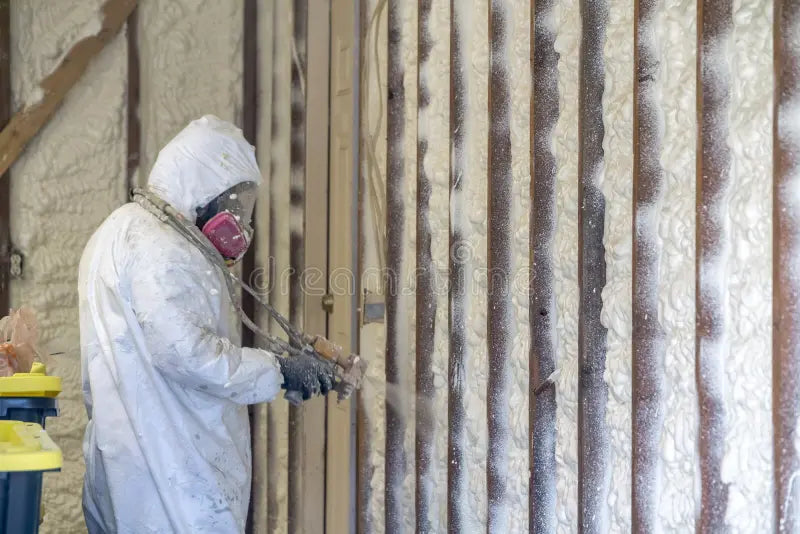If you're still battling high energy bills or uncomfortable rooms in 2025, it might be time to look behind the walls. Spray foam insulation has quickly become one of the smartest upgrades for homeowners looking to boost comfort, cut costs, and go greener especially as energy efficiency takes center stage this year.
But with new products, technologies, and marketing hype in the mix, choosing the right spray foam in 2025 can feel like navigating a maze. That’s why this guide is here: to break it all down clearly what to know, what to avoid, and how to make the best investment for your home. Let’s get started.

Key Takeaways
- Explore the diverse types of spray foam insulation and their unique properties
- Discover the remarkable benefits of spray foam insulation, from energy savings to enhanced air sealing
- Learn how to navigate the cost factors, including installation and material expenses
- Understand the importance of choosing a qualified spray foam insulation contractor
- Weigh the pros and cons of DIY versus professional installation
Understanding Spray Foam Insulation
Spray foam insulation is a great way to improve your home or workspace. It comes in open-cell foam and closed-cell foam types, each with its own benefits.
Types of Spray Foam Insulation
Open-cell spray foam is light and lets air through. It seals up gaps and is good for stopping air leaks. It might not be so thick, but it does a great job keeping your place warm or cool and helping keep moisture out.
Closed-cell spray foam is heavier and stronger. It forms a barrier that stops moisture well. It keeps your building warmer in winter and cooler in summer, making it perfect for places that get very hot or cold.
Benefits of Spray Foam Insulation

Spray foam insulation has many good points. It can make your place more comfortable and efficient. It can also add to the strength of your home or building. Here are some of the top benefits:
- Improved energy efficiency by reducing air leaks and heat transfer
- Enhanced indoor air quality by sealing out pollutants, allergens, and moisture
- Increased structural integrity and resistance to wind and water damage
- Reduced noise pollution by absorbing sound waves
- Versatile application for both residential and commercial projects
At VB Insulation, we're here to help with spray foam insulation. Our experts can find the perfect solution for you. Whether it's for your home or a big project, we've got you covered. Get in touch with us today to see how spray foam can help you
Spray Foam Insulation Buying Guide
Vega Bond V600 insulation kit is a top pick for many homeowners. It's a great way to keep your home warm in winter and cool in summer. This guide from VB Insulation will show you everything you need to know about buying spray foam insulation. We will talk about its types, how it's put in, and what rules to follow.
Types of Spray Foam Insulation
There are two types of spray foam: open-cell and closed-cell. Open-cell is less dense and cheaper, while closed-cell is denser and more effective at stopping heat loss. Your choice should depend on what you need and your budget.
The Spray Foam Insulation Installation Process
Installing spray foam insulation is a job for experts. They use a special machine to spray the foam into walls and attics. The foam must be put in evenly and at the right thickness. Knowing this process helps you talk to your contractor better.
Building Codes and Regulations
Before installing foam, make sure you understand your local building codes. These rules cover things like how thick the foam can be, fire safety, and ventilation. It's best to work with a pro who knows these rules well.
Thinking about the spray foam types, how it gets put in, and following the rules will help you choose the right insulation. VB Insulation is with you to help at every stage.

Cost Considerations for Spray Foam Insulation
Choosing spray foam insulation is a big step for homeowners. Knowing the costs of spray foam insulation helps make a smart choice. We at VB Insulation can walk you through the various costs of spray foam insulation.
Installation Costs
- Type of Spray Foam and Cost Range
-
-
Open-cell spray foam: $0.40–$0.80 per sq. ft.
-
Closed-cell spray foam: $1.00–$2.00 per sq. ft.
-
Example: 1,500 sq. ft. costs $600–$1,200 (open-cell) or $1,500–$3,000 (closed-cell)
-
-
Labor, Equipment, and Installation Fees
-
Labor makes up 30%–50% of total cost
-
Installation fees average $0.50–$1.50 per sq. ft.
-
Complex layouts can increase costs by 10%–25%
-
-
Home Size, Accessibility, and Regional Estimates
-
Small attic (500 sq. ft.): $250–$1,000
-
Whole-home insulation: $4,000–$8,000
-
Crawl spaces add $500–$1,500
-
Urban areas may cost 10%–20% more
-
Material Costs
The price of spray foam materials also changes. This is based on which foam and how much you need. Open-cell foam costs less, while closed-cell foam can save more energy over time.
Remember, you might get help with costs. Some homeowners can qualify for insulation rebates and tax credits, which can lower their overall spray foam insulation cost.
Think about both the short and long-term costs. Spray foam can make your home more energy-efficient and comfortable and add value. VB Insulation is here to help you make the best choice for you and your budget.
Choosing the Right Spray Foam Insulation Contractor
Choosing the right spray foam insulation contractor is key to success. It's important to pick someone skilled and reputable. They should have the needed licenses, certifications, and a good track record. This ensures you get quality work. Here's what to consider when selecting a contractor.
Licensing and Certifications
A good contractor should be licensed and certified. This means they know how to work safely and meet building codes. Make sure they have a state or municipal license and SPFA certifications. This shows they have the necessary training.
Experience and Reputation
Look for a contractor with lots of experience and a good reputation. Their past projects and what customers say about them matter. A skilled contractor is more likely to do a great job. Look at their website, reviews, and affiliations to learn more.
At VB Insulation, we take pride in our experienced team. Our team is certified and has years of experience. We aim to deliver top-notch service and results for every project.
Picking the best contractor is vital for your project's success. Choose someone with the right skills and experience. This way, you can trust that your insulation job will be done well. Enjoy energy savings and better home comfort.
DIY vs. Professional Installation
Homeowners considering spray foam insulation can choose between doing it themselves or hiring help. Each choice has its advantages and disadvantages. Examine the main things to consider so you can choose wisely for your home project.
The DIY Approach
Spray foam insulation can be a DIY project that can save you money, but it takes a lot of your time and energy. You're in charge of saving on worker fees. But remember, you'll need to learn about safety and how to do it right.
- Cheaper than getting a pro
- You control everything
- You need to study and plan well
- You must have the right safety gear
Professional Installation
Choosing a professional like VB Insulation offers many advantages. They know what they're doing and have all the right tools and safety measures. Yes, it costs more at first, but you could save a lot later because your heating bills will fall, and you'll need fewer repairs.
- They are skilled and certified
- They have the best tools and safety stuff
- You might get a warranty; they'll help if you need it later
- Your foam will be put in the right way for the best results
Think about what you know, what you have, and what risk you're willing to take. Doing it yourself is an achievement, but getting help from pros like VB Insulation could offer the best and safest results for your home's spray foam insulation.
Conclusion
Spray foam insulation is a great choice for many reasons. It's been excellent at keeping your home warm or cool, and it also blocks out moisture and drafts like no other.
There are different kinds of spray foam with unique benefits. Homeowners can pick what works best for them. VB Insulation helps every step of the way to make sure your project is a hit. They focus on making your home more efficient and your air cleaner.
When considering the cost and the environment, consider the big picture. The money spent is an investment that keeps paying off over time. Plus, choosing spray foam helps the planet. It's a win for your home and for a sustainable future.
FAQ
What are the different types of spray foam insulation?
There are two main types: open-cell and closed-cell foam. Open-cell foam is less dense and has a smaller R-value. Closed-cell foam is denser and offers a higher R-value. Your choice should consider your climate, budget, and specific home insulation needs.
What are the benefits of using spray foam insulation?
Spray foam insulation brings several advantages. It boosts energy efficiency, seals air better, and resists moisture. This can lower your energy bills, enhance your indoor air, and protect your home from weather better than traditional materials.
How much does spray foam insulation cost?
Costs vary based on foam type, project size, and installation method. On average, open-cell foam costs $0.44 to $1.00 per board foot, and closed-cell foam costs $1.00 to $1.50. For installation, add $1.00 to $3.00 per board foot.
How is spray foam insulation installed?
Professionals use special gear to apply spray foam. They spray it on surfaces, where it expands and hardens, creating an airtight barrier. Some projects allow for DIY, but they need safety gear and training.
How do I find a qualified spray foam insulation contractor?
Look for contractors who are licensed and certified and have industry experience. Review their credentials, customer feedback, and projects to verify their skill. This will ensure that the insulation is set up correctly and meets local standards.
What are the differences between DIY and professional spray foam insulation installation?
Choosing DIY is cheaper, but you need to be safe and skilled. Professional service costs more but guarantees quality work. Consider your project's complexity, access, and safety before choosing DIY or professional service.



